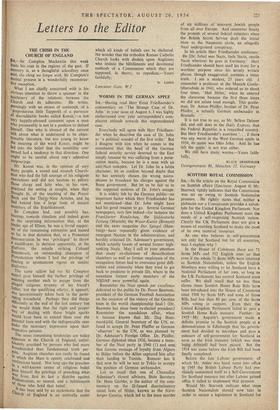Letters to the Editor
THE CRISIS IN THE CHURCH OF ENGLAND
§115.—Sir Compton Mackenzie this week trails his coat in the regions of the past. If Memory is, as a thoughtful schoolboy once laid, the thing we forget with, Sir Compton's mental process is a wonderfully reconstruc- tive exception.
What I am chiefly concerned with is his obvious intention to throw a spanner in the Machinery of the relations between the Church and its adherents. He writes, tcemingly with an excess of contempt, of a preposterous little Tappertit of a purveyor of discreditable books called Kensit,'—a not Very happily-phrased comment upon a man Who presumably is not in a position to defend himself. One who is abreast of the current talk about what is understood to be objec- tionable literature, but too young to know the meaning of the word Kensit, might be led into the belief that the notability con- cerned had a tendency in that direction. One ought to be careful about one's adjectival outpourings.
Mr. Kensit was, in the opinion of very many people, a sound and staunch Church- trian who had the full courage of his religious convictions and did not- hesitate to pillory those clergy and laity who, in his view, Practised the setting at nought, when they thought fit, of the teaching of the Prayer Book and the Thirty-Nine Articles, and he had behind him a large body of sincere members of the Establishment.
Sir Compton had, and possibly has, leanings towards ritualism and indeed gives Us the surprising information that, at the tender age of fifteen, he was a fervid suppor- ter of the romanising extremists and leaned lc) far in that direction that, at a Protestant demonstration he was ' privileged' to throw a cauliflower, in derision apparently, at the Platform, ' the missile . striking Colonel
Satinderson, an outstanding champion of
trotestantism whom I had the privilege of caring in spontaneous vigour on similar Platforms.
The same callow lad (so Sir Compton slates) gave himself the further privilege of assisting another such to escape from the
alleged religious tyranny of his friend's Lather, but the qualifying nfhrtyr, it appears, was ignominiously taken back to the perse- cuting household. Perhaps they did things
differently at the end of the last century but Way would think that the right and proper
way of dealing with those bright sparks Would, have been to extend them over the Parental knee and with the indispensable cane make the necessary impression upon their respective persons. The same romanising tendencies are today apparent in the Church of England, unfor- unately practised by persons who feel more broadminded than fundamental truth per- „_Its. Anglican churches can easily be found us which the Mass is openly celebrated and confessions heard. Not long ago the preacher nu a well-known centre of religious belief t aye himself the privilege of preaching what Zas from first to last a diatribe against iiecutestantism, .so named, and a belittlement
those who hold that belief.
i!t has been said by an ecclesiastic that the Church of England is an umbrella under
which all kinds of beliefs can be sheltered. No wonder that the orthodox Roman Catholic Church looks with disdain upon Anglicans who imitate the hAbiliments and devotional methods of a Communion which they are supposed, in theory, to repudiate.—Yours faithfully,


































 Previous page
Previous page